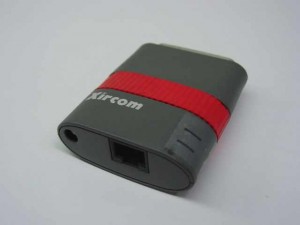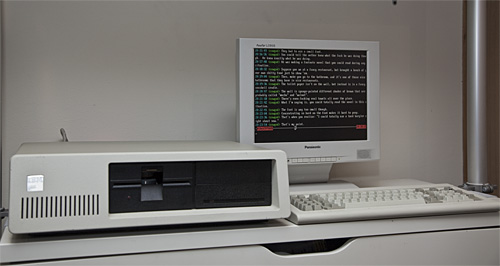I recently had the urge to fire up my IBM PC XT. The challenge usually is to do something interesting on the machine. Playing games slower than my Libretto 50CT or using Microsoft Word 1.0 is not especially interesting to me but hooking it up to my network and chatting on IRC… that’s more like it.
I have had this thought in the back of my head for a while. I knew it was possible to put it on a network but finding an 8-bit ethernet card is challenging. Not only are they super rare but on eBay now they are super expensive. I’m NOT paying $100 for a network card for a computer I only paid $20 for in the first place. As a rule, I’ve kept my retro computer hobby cheap so I wasn’t about to make an exception here.
In retro computing, patient generally equals cheap. This case was no exception. Someone on one of the IRC channels I hang out on randomly asked me if I wanted another Libretto. Of course I do! Any Librettos will find a good home here. This person graciously sent me not only a nice Libretto 70CT but also a bunch of accessories including a Xircom PE3-10BT pocket ethernet adapter.

This is something I had NO idea existed. It is an ethernet adapter that hooks up to a parallel port. It also has a short PS/2 keyboard pass through cable that supplies power since parallel ports don’t have power in their specification.
This left me with two problems on my XT. First off,the XT has no where to plug in a PS/2 keyboard and second, while I have a parallel port on my AST Six Pack Plus expansion card, the pigtail for it is long gone. The previous owner probably never installed it in the first place even though MSD(Microsoft Diagnostics) showed that the port was activated.
I poked around online a bit and saw that 8-bit ISA parallel port cards are a whopping $30. No thanks. I poked around my garage and found a 16-bit ISA controller card. This one was just like the 100’s that I installed when I was building clones (as a profession) back in the 386/486 days. Now I know there is no chance that the IDE bus would work in an 8-bit ISA slot but I thought there was a good chance that the parallel port would work so I jammed the 16-bit ISA controller in the 8-bit card slot and let the extended part of the bus hang over the slot. I disabled EVERYTHING on the controller except the parallel port. Lucky enough, I fired up the computer and it showed up in MSD as a bidirectional parallel port. Yay!!
The next challenge was getting power to it. I ended up building a very convoluted adapter that went from PS/2 to AT to a hacked midi cable and then to a hard drive Y-cable. It’s ugly but it works flawlessly. When I get the proper connectors, I will build something proper.
After that, there was nothing left to do but fire it up and snag the software for it. First off I needed a packet driver for the Xircom card. Since Intel bought Xircom many moons ago, they still have the drivers available on their website. (Xircom PE3 Driver). So after you unpack the driver, you simply run PE3PD.EXE and it will work if all the hardware is in order.
Second, you need a TCP/IP stack and some applications. This is solved by the mTCP project. This project has a DHCP client, Telnet, FTP Client/Server, IRC, Ping, Netcat, an NTP client and a WGET clone of sorts. One of the most surprising things to me was that this project is still extremely current. As of this blog post, the last update was October 29th, 2011. Even if there is never another update though, I’m fairly impressed with what I see. The IRC client, IRC JR, works flawlessly after you set up the config files which is well documented.
I could use this machine as a terminal for one of my more powerful machines as something mundane like a clock but being able to hook it up and use it as a well-equipped IRC client is fairly pleasing and gives me many more excuses to fire up my XT in the future here.
If you like the content on this site, please support it by using this link to order from Amazon. You know you were going to go there and buy stuff anyhow so why not help me pay the hosting bill.



Cool. I coulda sent you the 8bit 3C503 card, but that wouldn’t have been nearly as much fun as the Xircom adapter 😉 Now I’d really be impressed if you figured out some way to get wifi on that old beastie.
Hehe.. Thanks again for sending me that adapter and giving me the idea to use it on that in the first place. I could easily do wifi through the cheater method of using a wrt54g as a bridge but doing it legitimately would require a bit of trickery since I’m pretty sure there never were any 8-bit wifi chipsets. It would probably be some sort of bus switching/multiplexing thing similar to the way the XT-IDE adapter works. THEN you’d have the fun of making drivers work….
I was pining for my xt and regretting (again) that I’d ever gotten rid of her. This made my day.
Thanks for this info! I am starting a project to get an XT connected, and have been searching for the drivers for my eBay Xircom PE3. The Intel driver site seems to be gone, but by searching for the filename that you provided, PE3PD.EXE, I was able to find them!
Thanks again…
Shane
That’s awesome! Glad I could help. Could you post a link to the file here?